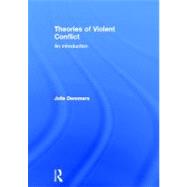- ISBN: 9780415555333 | 0415555337
- Cover: Hardcover
- Copyright: 7/12/2012
This textbook introduces students of violent conflict to a variety of prominent theoretical approaches, and to examine the ontological stances and epistemological traditions underlying these approaches. In reviewing theories of conflict, this book takes the centrality of the group as actor in contemporary conflict as a point of departure. In the post-Cold War shift from inter-state to intra-state conflict, the key role of the group - ethnic, religious, cultural and other - in most conflicts is widely acknowledged: of the 118 conflicts that have taken place between 1989 and 2004, only 7 have been inter-state wars. This implies that any meaningful analysis of contemporary conflict should involve the study of (identity) group formation, dynamics of interaction and collective action. We are left with three main questions from this departure point: What makes a group? Why and how does a group resort to violence? Why and how do or don#xE2;#xAC;"t they stop? This book aims to examine and compare the ways by which these questions are addressed from a number of prominent research perspectives: constructivism, social identity theory, structuralism, political economy, human needs theory, relative deprivation theory, collective action theory, and rational choice theory. The final chapter of the book aims to synthesize structure and agency-based theories by proposing a structurationist approach to violent conflict. This book will be essential reading for students of war and conflict studies, peace studies, conflict analysis and conflict resolution, and ethnic conflict, as well as security studies and IR in general.







